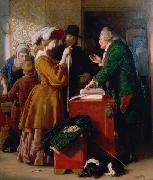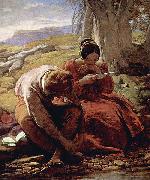All William Mulready's oil paintings


|
|
|
| ID |
Image |
Oil Pantings, Sorted from A to Z |
Other Information |
| 94512 |
 |
Choosing the Wedding Gown |
1786-1863
cjr |
| 94517 |
 |
Das Sonett |
1839(1839)
Medium oil on panel
Dimensions 36 x 31 cm (14.2 x 12.2 in)
cjr |
|
|
| William Mulready
|
| (1 April 1786 - 7 July 1863) was an Irish genre painter living in London. He is best known for his romanticizing depictions of rural scenes, and for creating Mulready stationery letter sheets, issued at the same time as the Penny Black postage stamp.
William Mulready was born in Ennis, County Clare. Early in his life, in 1792, the family moved to London, where he was able to get an education and was taught painting well enough so that he was accepted at the Royal Academy School at the age of fourteen.
Choosing the Wedding Gown
illustrating ch 1 of Vicar of Wakefield by Oliver GoldsmithIn 1802, he married Elizabeth Varley (1784-1864), a landscape painter. Their three children, Paul Augustus (1805-1864), William (1805-1878), and Michael (1807-1889) also became artists. His relationship with his wife however deteriorated gradually over the years, which is detailed in papers stored at the library of the Victoria and Albert Museum. His strong Catholic beliefs prevented any chance of a divorce but they separated. He accused her of "bad conduct" but shied from providing details. In a letter to him in 1827 she blamed him entirely for the collapse of their marriage, suggesting cruelty, pederastic activities and adultery were the reasons.
His son, William Mulready Junior (1805-1878), lived in London and maintained a career of a portrait painter and picture restorer. He had five children (Ellen, Mary, Augustus Edwin, Henry William, and John).They also were trained as artists, but not all of them pursued the artistic career: Henry William and John described themselves as 'house painters'. Augustus Edwin Mulready (1844-1904) was the most successful of them and became known as a member of the Cranbrook Colony of artists.
. Related Artists to : | Antonio de Pereda | Hieronymus Francken | Angelo Morbelli | toulouse-lautrec | Eugene Giraud | |

|
|

|
|